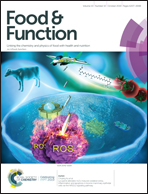Selenium influences mmu-miR-155 to inhibit inflammation in Staphylococcus aureus-induced mastitis in mice
Abstract
Mastitis, a major disease affecting dairy cows, is most commonly caused by Staphylococcus aureus (S. aureus). Selenium (Se) can activate pivotal proteins in immune responses and regulate the immune system, and microRNA-155 (miR-155) is a key transcriptional regulator for inflammation-related diseases. We constructed the model of mouse mastitis in vivo and primary mouse mammary epithelial cells (MMECs) in vitro, which were induced by S. aureus. Se content of the mammary was estimated using an atomic fluorescence spectrophotometer. Histopathological analysis was performed via hematoxylin and eosin (H&E) staining. The mmu-miR-155-5p mimic was transfected in MMECs, and viability was determined through the MTT assay. Transfected efficiency was evaluated by qPCR and fluorescence staining. Cytokines including TNF-α, IL-1β, IL-10 and TLRs were detected with qPCR. In addition, western blotting was used to evaluate the expression of the NF-κB and MAPKs signaling pathways. The results demonstrated that a Se-supplemented diet improved the content of Se in mammary tissues. Histopathological studies indicated that the mammary glands were protected in the Se-supplemented group after S. aureus infection. Se-supplementation suppressed the production of MPO, mmu-miR-155, TNF-α, IL-1β, and TLR2 and significantly inhibited the phosphorylation of NF-κB and MAPKs in vivo and in vitro. All the data indicated that mmu-miR-155 played a pro-inflammatory role in our study, and Se-supplementation could suppress the expression of mmu-miR-155 to inhibit inflammation in S. aureus-induced mastitis in mice.



 Please wait while we load your content...
Please wait while we load your content...